 |
| AP Board Class 8 Physical Science Chapter 2 Friction Textbook Solutions PDF: Download Andhra Pradesh Board STD 8th Physical Science Chapter 2 Friction Book Answers |
Andhra Pradesh Board Class 8th Physical Science Chapter 2 Friction Textbooks Solutions PDF
Andhra Pradesh State Board STD 8th Physical Science Chapter 2 Friction Books Solutions with Answers are prepared and published by the Andhra Pradesh Board Publishers. It is an autonomous organization to advise and assist qualitative improvements in school education. If you are in search of AP Board Class 8th Physical Science Chapter 2 Friction Books Answers Solutions, then you are in the right place. Here is a complete hub of Andhra Pradesh State Board Class 8th Physical Science Chapter 2 Friction solutions that are available here for free PDF downloads to help students for their adequate preparation. You can find all the subjects of Andhra Pradesh Board STD 8th Physical Science Chapter 2 Friction Textbooks. These Andhra Pradesh State Board Class 8th Physical Science Chapter 2 Friction Textbooks Solutions English PDF will be helpful for effective education, and a maximum number of questions in exams are chosen from Andhra Pradesh Board.Andhra Pradesh State Board Class 8th Physical Science Chapter 2 Friction Books Solutions
| Board | AP Board |
| Materials | Textbook Solutions/Guide |
| Format | DOC/PDF |
| Class | 8th |
| Subject | Physical Science |
| Chapters | Physical Science Chapter 2 Friction |
| Provider | Hsslive |
How to download Andhra Pradesh Board Class 8th Physical Science Chapter 2 Friction Textbook Solutions Answers PDF Online?
- Visit our website - Hsslive
- Click on the Andhra Pradesh Board Class 8th Physical Science Chapter 2 Friction Answers.
- Look for your Andhra Pradesh Board STD 8th Physical Science Chapter 2 Friction Textbooks PDF.
- Now download or read the Andhra Pradesh Board Class 8th Physical Science Chapter 2 Friction Textbook Solutions for PDF Free.
AP Board Class 8th Physical Science Chapter 2 Friction Textbooks Solutions with Answer PDF Download
Find below the list of all AP Board Class 8th Physical Science Chapter 2 Friction Textbook Solutions for PDF’s for you to download and prepare for the upcoming exams:8th Class Physical Science 2nd Lesson Friction Textbook Questions and Answers
Improve Your Learning
Question 1.
Do you agree with the statement, “friction is both good and an evil”? Explain with examples.
Answer:
Yes, I agree with the statement friction is both good and an evil.
Explanation with examples.
a) Friction is good:
- We cannot walk or run without friction.
- We will not have any cars or bicycles because all of them move because of friction.
- We cannot stop a moving car by applying brakes.
- Carpenters will not be able to smoothen surfaces.
- We will not able to hold any appliances such as hammer, soap, etc.
- It will not possible to write with pen or pencil if there is no friction.
- We could not fix nail on the wall.
- No building could be constructed if there is no friction.
b) Friction is an evil: Friction is undesirable in machinery because it is responsible for overheating and wearing out of moving parts.
Question 2.
Explain why sportsmen use shoes with spikes.
Answer:
The spikes will increases the frictional force so that the sportsmen will get better grip on the floor.
Question 3.
Would it be easier or more difficult for you to walk on soapy water on the marble floor ? Why ?
Answer:
It is more difficult to walk on a marble floor having soapy water because soapy water acts as lubricant and decreases the friction.
Question 4.
What ways do you suggest to reduce friction?
Answer:
Ways of reducing friction:
a) Polishing: Decreasing irregularities of surface (or) smoothening the surface.
B) Lubricants: Using lubricants which will decrease the friction.
c) Ball bearings: Using ball bearings in machinery.
d) Steam lining: Automobiles and aeroplanes are steam lined to reduce the friction due to air.
Question 5.
What conditions are needed for static friction to come into play?
Answer:
The object should be at rest with respect to the surface upto certain limiting acceleration.
Question 6.
Give examples of practical application of static friction.
Answer:
The objects unable to move on their own is due to static friction between surfaces of object.
The practical application of static friction:
- Construction of buildings.
- Fixing nail in the wall.
- A book placed in the shelf unable to change its position because it is unable to overcome frictional force.
- We can write with pen or pencil due to static friction between finger and pen or pencil.
- We will not able to hold appliances such as hammer.
Question 7.
Give examples showing the existence of sliding friction.
Answer:
- A moving ball stops after sometime.
- If we push an object it will stop after sometime.
Question 8.
Explain how can you measure frictional force?
Answer:
Tie a string around a brick. Pull the brick by a spring balance. When the brick just begins to move note down the reading on the spring balance that measure the force of friction between the surface of brick and the floor.
Question 9.
Explain how does lubrication reduce friction?
Answer:
When oil, grease or any other lubricants are applied between the moving parts of a machine, a thin layer formed between the moving surfaces so they do not directly rub against each other which will avoid the interlocking of irregularities. So lubrication reduce the friction.
Question 10.
What kinds of friction do you know?
Answer:
There are three types of friction.
- Static friction
- Sliding friction
- Rolling friction
Question 11.
Explain why sliding friction is less than static friction.
Answer:
When an object starts sliding, the contact points on its surface do not get enough time to lock into the contact points on the floor. So the sliding friction is slightly less than the static friction.
Question 12.
Give examples of how is friction responsible for energy wastages? Give suggestions to reduce energy wastages by friction.
(OR)
How is friction responsible for energy loses give examples? Give suggestions to reduce energy loses by friction.
Answer:
As the friction increases the machinery parts develops heat there by efficiency of the machine decreases which leads lot of wastage of energy. The wastage of energy is due to overheating and wearing out of moving parts.
Suggestions:
- To reduce friction between rotating shafts of machine tools we should have to use ball bearings.
- Replacing wearing out of moving parts with new ones.
Question 13.
Seetha is observing a moving bus with the luggage on its top. As the bus is moving slowly there is change in the state of luggage on its top. But when the bus speeds up and starts moving fast, she noticed that the luggage on the top of the bus fell to the back of the bus. This raised many doubts in her mind regarding to the effect frictional force acting on the luggage as well as on the tyres of the bus. Can you guess the questions raised in her mind ? Write them.
Answer:
- Why the bag is moving backward direction?
- In which direction friction is acting on the bus as well as on the bag?
- Whether frictional force effecting relative motion between bag and bus?
- What happens to frictional force if we replace bag with other object?
Question 14.
Collect information either from internet or from books in library, about various new techniques being adopted by human beings to reduce energy losses due to friction. Prepare a note on that.
Answer:
- We are using grease, oil, wax and other lubricants in the vehicles and machinery to reduce the friction.
- Ball bearings are also used to reduce the friction.
- Engine oil, gear oil, brake oil, clutch oil, etc. are used in vehicles.
- Shock up oil is also used.
- Levers are reducing the friction.
- In trolleys and other vehicles which should carry heavy loads, the wheels are fixed.
Question 15.
Draw a free body diagram (FBD) to show various forces acting on a body which is sliding on an inclined plane.
Answer:
Question 16.
“Reducing friction to the lowest possible level in machine tools solves the problem of energy crisis and conserve biodiversity”. How do you support the statement? Explain.
Answer:
Yes, it will solve the problem of energy crisis and conserve biodiversity the reason is the majority of energy wasted in the form of heat energy due to friction. In order to develop more electrical energy we are depending on coal, petroleum, gas, nuclear energy and hydro electricity. The production of energy from these sources except hydroelectric power causing severe air pollution which are affecting animals and plants. So energy should be conserved by means of reducing friction.
8th Class Physical Science 2nd Lesson Friction InText Questions and Answers
Think and Discuss
8th Class Physical Science Textbook Page No. 22
Question 1.
Does friction oppose motion or relative motion of surfaces in contact? Discuss.
Answer:
Yes. Frictional force opposition or relative motion of surfaces in contact that’s why an object placed on a table unable to move on its own because it is unable to overcome friction similarly a moving ball comes to rest after sometime due to friction.
Question 2.
What observations and experiments can you cite to show the existence of friction?
Answer:
- Push a ball on a sandy surface and on a concrete surface and the observation is on a concrete surface it travels more distance, the reason is the concrete surface apply less frictional force on the ball.
- Apply vehicle brakes during summer and rainy seasons and the observation is during summer season the brakes works more efficiently than rainy season the reason is friction between tyre and brakes is less because rainy water acts as lubricant.
Question 3.
When do we speak of sliding friction?
Answer:
When applied force is more than the limit of static friction, the body starts to move then we speak about sliding friction.
8th Class Physical Science Textbook Page No. 25
Question 4.
Does friction act on a table resting on the floor?
Answer:
Yes, frictional force is acting on the table which is known as static friction.
Question 5.
If normal force is doubled ? What happens to friction? Discuss.
Answer:
Friction is directly proportional to normal force therefore friction will be doubled if the normal force is doubled.
Question 6.
Your friend says “friction depends on the area of contact?” How do you correct your friend through some experiments ?
Answer:
If is plain that the friction doesn’t depend on area of contact, I will explain this fact to my friend by fastening a brick kept horizontal to the surface to a spring balance and pulling it at the hook. The same experiment I do by keeping the brick vertical to the surface. In both the experiments we find no difference and I will make him to come to the conclusion that the friction depends on the normal force and not on weight of the object on the surface of contact.
Question 7.
“Friction is independent of weight, but depends on normal force between surfaces of contact where friction exists.” Do you agree with this statement? Discuss.
Answer:
Yes, I agree with this statement. The above experiment helps us to come to this conclusion. In both cases we used the same brick hence the weight doesn’t change. But when its positions were changed the frictions at each case is changed.
8th Class Physical Science Textbook Page No. 26
Question 8.
What important role does friction play in the life of human beings and animals?
Answer:
- Without friction human beings and animals unable to walk or run on any surface.
- Without friction they unable to hold any appliances.
- It will not be possible to write with pen or pencil if there is no friction.
- We cannot stop car or cycle by applying brakes.
- No building is constructed if there is no friction.
- Carpenters will not be able to smoothen surfaces.
Question 9.
Why is friction important for transport?
Answer:
Threading in tyres provide friction for cars or buses so that they can move safely therefore friction is important for transport.
8th Class Physical Science Textbook Page No. 28
Question 10.
Can we reduce friction to zero? Explain.
Answer:
No, we cannot. Friction can never be entirely eliminated because no surface is perfectly smooth and some irregularities are always there.
Question 11.
What purposes are served by bearings in machines? Explain with daily life situations.
Answer:
The ball bearings are used to reduce friction between rotating shafts of machine tools and it increases the efficiency of machines.
8th Class Physical Science 2nd Lesson Friction Activities
Activity – 1
Question 1.
Identifying forces acting on a body and effect of frictional force.
Gently push a book on a horizontal floor. You may observe that the book acquires certain speed in the direction of push. However, the speed of the book gradually decreases and after sometime it stops.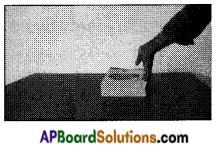
a) Why does the book stop after covering some distance?
Answer:
Some opposing force is acting to its motion.
b) Is the book moving with uniform speed?
Answer:
No, its speed decreases gradually.
c) Why does the speed of the book change gradually?
Answer:
Some net force is acting opposite direction to its motion.
d) How many forces act on the book when it is pushed on the floor?
Answer:
Two forces act on the vertical direction. They are
- Weight of the book or gravitational force acting vertically down.
- Normal force or reaction force applied by the floor vertically up.
- Forces acting horizontal direction.
e) What are the forces acting on the book in the horizontal direction?
Answer:
- Muscular force applied by us.
- Opposing force acting opposite to motion of book.
f) What is the net force acting in the horizontal direction?
Answer:
The net force is the difference between muscular force and opposing force to the motion of book.
Lab Activity
Write an activity to understand friction and static friction.
(OR)
Conduct an experiment to understand the nature of friction and the concept of static friction.
Answer:
Aim: To understand the nature of friction and the concept of static friction.
Materials required: Toy trolley, small wooden block, inextensible string, weight hanger, weights, pulley and table.
Procedure: Take a small toy trolley and keep a small wooden block on it as in the figure. Tie an inextensible string to the trolley and pass it over a pulley. And other end of the string is fixed to weight hanger. Take a small weight and keep it on weight hanger and observe the changes in motions of block and trolley.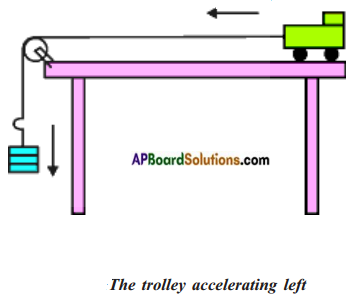
Observation:
The trolley with block moves towards left with an acceleration. The block is not with respect to the surface of trolley, but it is in motion with respect to surface e table. The force of friction of the trolley acts on the direction of motion.
We increase trolley’s acceleration gradually by increasing the weight on the hanger at certain limiting weight the block comes in motion in the reverse direction.
That means now there exists relative motion between the surface of the trolley and block.
Result:
The force which opposes the relative motion of the two surfaces of bodies which are in contact is called frictional force.
The block is at rest relative to surface of the trolley upto a certain limiting acceleration. The friction exists at that stage is called static friction.
Activity – 2
Question 2.
Observing the variation of friction.
Push a heavy box which is kept on a floor. The box does not move. Now increase the applied force until the box moves.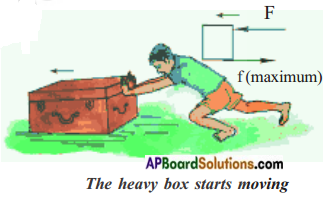
a) Why does the box does not move at first?
Answer:
The applied force is less than frictional force (static friction).
b) When does the box tends to move?
Answer:
When the applied force is more than static friction.
Activity – 3
Question 3.
Effect of roughness on frictional force.
Set up an inclined plane on the horizontal floor. Use a wooden board as inclined plane. Put a mark at any point
‘A’. Now let a pencil cell or ball is move down from this point. Note down the distance travelled by the ball from the bottom of the inclined plane to point where it comes to a stop.
Now, spread a cloth over the floor. Try again with ball and note down the distance.
a) What are your observations from these experiments?
Answer:
The distance covered by ball in the two cases are different.
b) In which case is the distance covered maximum?
Answer:
When there is no cloth on the floor.
c) In which case is the distance covered minimum?
Answer:
When cloth is spread over the floor.
d) Why is the distance covered by the pencil cell different on different surfaces?
Answer:
Because, the friction offered by different surfaces are different.
e) If the cloth is replaced with white marble surface or glass surface, what will be your prediction about the distance covered by the pencil cell?
Answer:
The pencil cell covers more distance.
Activity – 4
Question 4.
Effect of area of contact on frictional force.
Tie a string around a wooden block and pull the wooden block by using a spring balance.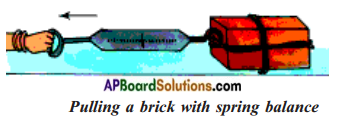
Pull it to make a move in the brick. Note down the readings of spring balance when the brick just begins to move.
a) How many forces are acting on the wooden block in the horizontal direction?
Answer:
Two forces are acting in the horizontal direction.
- Force of friction,
- Force applied by us.
Now turn the wooden block upright and measure the friction by doing the same experiment using the reading of the spring balance.
b) How does the frictional force vary with the change in the area of contact?
Answer: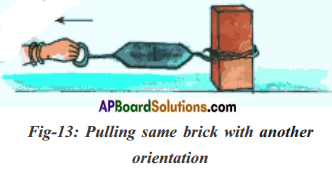
The frictional force appears the same in both cases irrespective of area of contact. So it is independent of area of contact.
Activity – 5
Question 5.
Effect of normal force on friction.
Keep a wooden block on the horizontal floor and pull it with the spring balance attached to it and measure the frictional force.
Now put another wooden block over the brick tied to the spring balance or press it vertically with your hand and measure the frictional force.
a) Is there any difference between frictional forces in two cases? If yes, why?
Answer:
Yes, the reason is when we add a wooden block to the existing wooden block or apply force by pressing vertically, the normal force increases and hence we find increase in frictional force.
b) What is the relationship between friction and normal force?
Answer:
Friction is proportional to the normal force, i.e., friction °c normal force.
Activity – 6
Question 6.
Friction produces heat.
a) Rub your palms against each other for a few minutes. How do you feel?
Answer: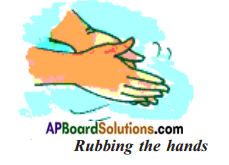
They became hot.
b) Strike a match stick against the rough surface of match box. What happens?
Answer:
The match stick catches fire.
c) What is your observation in this activity?
Answer:
Temperature of surfaces increases due to friction.
d) What is your conclusion on this activity?
Answer:
Friction can also produce heat.
e) You have probably heard that space craft returning to the earth have to be protected by a heat shield covering it. Find out why. What is the material used as heat shield?
Answer: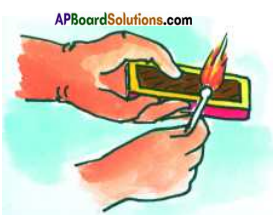
Space craft returning earth have to be protected by a heat shield covering it in order to protect it from atmospheric friction.
The material generally used is insulator of heat.
Activity – 7
Question 7.
How to increase Motion?
Take a spoon and hold its head (broader portion) in the left hand and hold the mid portion of the spoon by the right hand and pull it towards the other end of the spoon.
a) What do you notice?
Answer:
We unable to pull the spoon.
Now dip your right hand fingers in water, do it again as said above.
b) In which case is it easy to pull? Why?
Answer:
In second case it is easy to pull because water decreases the friction.
c) Have you ever thought why the sole of your shoes is grooved as shown in figure?
Answer: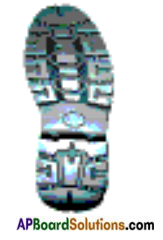
It will provide shoes better grip on the floor so that we can move safely.
d) Cars, trucks and bulldozers tyres are threaded. Why?
Answer: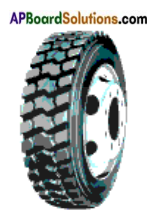
To provide them better grip on the floor.
e) Why do you need to change the tyres when it’s threading is worn out?
Answer:
If we does not change the tyre then the frictional force decreases and the vehicle may skid.
Play carrom board without powder and then play with fine powder sprinkled on board.
f) In which case is the movement of the striker and the coins easy? Why?
Answer:
When fine powder sprinkled on board, it will decrease the friction between coin and board surface.
g) Why do we pour a few drops of oil on the hinges of a door?
Answer:
It will decrease the friction and provide better movement of door.
h) Why do we use grease between the moving parts of motor vehicles?
Answer:
To reduce friction in order to increase efficiency.
Activity – 8
Question 8.
Effect of rollers on friction.
Pull a suitcase without rollers and pull a suitcase which has rollers.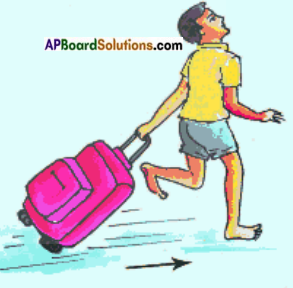
a) In which case is the pulling easy? Why?
Answer:
It is easy to pull when suitcase has rollers.
Try to push a book lying on the table. Now place the book on two to three pencils or pens without caps. Push the book again.
b) What do you notice ? In which case is it easy to pull the book? Why?
Answer:
In the second case it is easy to pull the book. The reason is it is always easier to roll a body than to slide it over a surface.
Activity – 9
Question 9.
Understanding the principle of ball bearings.
Take two lids and rotate them by putting one on the top of the other.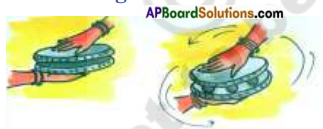
a) What do you observe?
Answer:
It is difficult to rotate them.
Now place three to four marbles on one lid and place the other lid on the top of the marble. Now try to rotate the top lid.
b) What do you observe?
Answer:
Now we can easily rotate the lid because rolling friction is less than sliding friction.
c) What is your conclusion on the principle of ball bearings?
Answer:
We can easily rotate top lid by placing marbles between the lids. This is the principle of ball bearings.
Activity – 10
Question 10.
Observing fluid friction.
Take a glass of water and stir it with a spoon. You know that water whirls around an axis. Stop stirring and see what happens.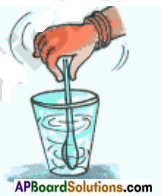
The whirling speed of water gradually decreases and after some – time, the water stops whirling and comes to a stable state
a) Which force is responsible for stopping the rotation of the water.
Answer:
The frictional forces between the liquid layers or between the liquid surfaces that is in contact with glass surface.
Activity – 11
Question 11.
Identifying factors influencing the fluid friction.
Take a tub of water. Try to move your hand in water in the direction of stretched fingers i.e., up and down. Now try to move your hand in the direction perpendicular to the plane of the hand i.e., to and fro.
a) In which orientation of your hand, do you experience more drag? Why?
Answer:
We experience more drag in the direction of stretched fingers. The frictional force on an object in a fluid depends on its speed with respect to fluid and on the shape of the object and nature of the fluid.
When objects move through fluids, they have to overcome friction acting on them. So objects are given special shapes to minimise fluid friction.
b) Where do you think scientists get hint for these special shapes?
Answer:
From nature i.e., from birds and fishes, which have to move about in fluids all the time.
c) Do you find any similarity in the shape of an aeroplane and a bird? Why?
Answer:
Yes. The shape of aeroplane designed as bird in order to reduce fluid friction.
AP Board Textbook Solutions PDF for Class 8th Physical Science
- AP Board Class 8 Textbook Solutions PDF
- AP Board Class 8 Physical Science Textbook Solutions PDF
- AP Board Class 8 Physical Science Chapter 1 Force Textbook Solutions PDF
- AP Board Class 8 Physical Science Chapter 2 Friction Textbook Solutions PDF
- AP Board Class 8 Physical Science Chapter 3 Matter Around Us Textbook Solutions PDF
- AP Board Class 8 Physical Science Chapter 4 Synthetic Fibres and Plastics Textbook Solutions PDF
- AP Board Class 8 Physical Science Chapter 5 Metals and Non-Metals Textbook Solutions PDF
- AP Board Class 8 Physical Science Chapter 6 Sound Textbook Solutions PDF
- AP Board Class 8 Physical Science Chapter 7 Coal and Petroleum Textbook Solutions PDF
- AP Board Class 8 Physical Science Chapter 8 Combustion Fuels and Flame Textbook Solutions PDF
- AP Board Class 8 Physical Science Chapter 9 Electrical Conductivity of Liquids Textbook Solutions PDF
- AP Board Class 8 Physical Science Chapter 10 Reflection of Light at Plane Surfaces Textbook Solutions PDF
- AP Board Class 8 Physical Science Chapter 11 Some Natural Phenomena Textbook Solutions PDF
- AP Board Class 8 Physical Science Chapter 12 Stars and the Solar System Textbook Solutions PDF
- AP Board Class 8 Physical Science Chapter 1 బలం Textbook Solutions PDF
- AP Board Class 8 Physical Science Chapter 2 ఘర్షణ Textbook Solutions PDF
- AP Board Class 8 Physical Science Chapter 3 మన చుట్టూ ఉన్న పదార్థం Textbook Solutions PDF
- AP Board Class 8 Physical Science Chapter 4 కృత్రిమ దారాలు మరియు ప్లాస్టిక్లు Textbook Solutions PDF
- AP Board Class 8 Physical Science Chapter 5 లోహాలు మరియు అలోహాలు Textbook Solutions PDF
- AP Board Class 8 Physical Science Chapter 6 ధ్వని Textbook Solutions PDF
- AP Board Class 8 Physical Science Chapter 7 నేలబొగ్గు మరియు పెట్రోలియమ్ Textbook Solutions PDF
- AP Board Class 8 Physical Science Chapter 8 దహనం ఇంధనాలు మరియు మంట Textbook Solutions PDF
- AP Board Class 8 Physical Science Chapter 9 ద్రవాల విద్యుత్ వాహకత Textbook Solutions PDF
- AP Board Class 8 Physical Science Chapter 10 సమతలాల వద్ద కాంతి పరావర్తనం Textbook Solutions PDF
- AP Board Class 8 Physical Science Chapter 11 కొన్ని సహజ దృగ్విషయాలు Textbook Solutions PDF
- AP Board Class 8 Physical Science Chapter 12 నక్షత్రాలు – సౌరకుటుంబం Textbook Solutions PDF






0 Comments:
Post a Comment